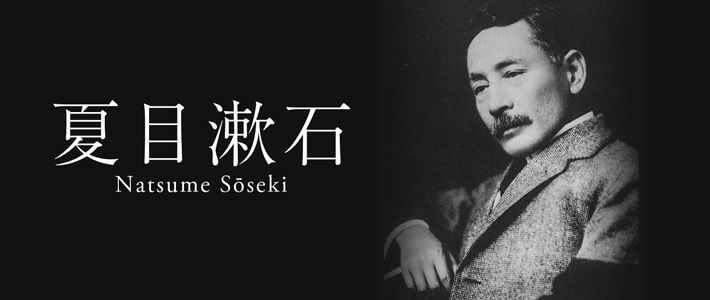Haiku, a form of traditional Japanese poetry renowned for its brevity and evocative power, has captivated readers worldwide with its ability to distill profound moments into just a few words. Over the centuries, many celebrated Japanese novelists have also made significant contributions to the world of haiku, demonstrating their versatility and deep understanding of poetic expression. In this article, we explore the lives and haiku poetry of some of Japan’s most illustrious novelists, showcasing their mastery of both prose and poetry.
See also: Why Haiku Can Tell the Longest Story with the Least Number of Words?
1. Natsume Sōseki (1867-1916)
Natsume Sōseki, often considered the greatest novelist in modern Japanese literature, was not only a masterful writer of novels such as “Kokoro” and “I Am a Cat” but also a gifted haiku poet. Sōseki’s haiku reflect his keen observation of nature and human emotions, often imbued with a sense of melancholy and introspection. His ability to capture fleeting moments in nature resonates deeply with the essence of traditional haiku.
Here are a few examples of Natsume Sōseki’s haiku:
Ah, autumn evening,
in the deepening haze,
a cawing of crows.
A white chrysanthemum;
and beside it,
my sad face.
2. Kawabata Yasunari (1899-1972)
Kawabata Yasunari, the first Japanese author to receive the Nobel Prize in Literature, is renowned for his delicate prose and exploration of existential themes. Beyond his novels like “Snow Country” and “The Sound of the Mountain,” Kawabata was a proficient haiku poet. His haiku often evoke the serene beauty of nature and the fleetingness of human experience, echoing the themes prevalent in his longer works.
Here are a few examples of Kawabata Yasunari’s haiku:
Lightning flash:
what I thought were faces,
are plumes of pampas grass.
The summer river;
although there is a bridge,
my horse goes through the water.
3. Kobayashi Hideo (1902-1983)
Kobayashi Hideo, a prominent intellectual and novelist known for his works such as “The Crab Cannery Ship” and “The Man Who Survived,” was also a dedicated haiku poet. His haiku often delve into the complexities of human emotions and the subtle beauty found in everyday life. Kobayashi’s profound understanding of language and imagery is evident in his succinct haiku compositions.
Here are a few examples of Kobayashi Hideo’s haiku:
The summer grasses:
all that remains
of warriors’ dreams.
At the ancient pond,
a frog plunges into
the sound of water.
4. Tanizaki Jun’ichirō (1886-1965)
Tanizaki Jun’ichirō, known for his exploration of eroticism and psychological depth in novels such as “The Makioka Sisters” and “The Key,” also demonstrated a talent for haiku poetry. His haiku often exhibit a sense of sensuality and intrigue, capturing moments of illumination and shadow in nature and human interaction.
Here are a few examples of Tanizaki Jun’ichirō’s haiku:
Upon a withered bough,
a crow has alighted;
nightfall in autumn.
From the deepening gloom,
emerges a paper lantern,
faintly aglow.
5. Ōe Kenzaburō (1935-)
Ōe Kenzaburō, a modern literary giant known for his complex narratives and deep exploration of social and existential themes, is also a noted haiku poet. His haiku reflect a deep engagement with nature, often juxtaposed with contemporary concerns and human struggles. Ōe’s haiku are characterized by their introspective depth and philosophical undertones.
Here are a few examples of Ōe Kenzaburō’s haiku:
From the distant mountains,
the cries of deer,
echoing in the twilight.
In the empty sky,
a single cloud drifts,
vanishing without a trace.
Conclusion
The intersection of novel writing and haiku poetry in Japanese literature offers a fascinating glimpse into the multifaceted talents of these renowned authors. From Natsume Sōseki’s introspective observations to Kawabata Yasunari’s delicate imagery, each novelist-poet has left an indelible mark on both forms of literary expression. Their haiku, much like their novels, continue to resonate with readers around the world, capturing moments of beauty, melancholy, and contemplation.
As we celebrate these famous Japanese novelists who also excelled as haiku poets, we recognize their enduring contributions to the rich tapestry of Japanese literature and their ability to evoke profound emotions in just a few lines of verse.
FAQs About Japanese Novelists Who Are Also Haiku Poets
1. How did these novelists balance their careers as novelists and haiku poets?
For many of these novelists, writing haiku provided a creative outlet that complemented their longer prose works. They often approached haiku as a form of meditation or reflection, capturing fleeting moments and emotions in concise verse while dedicating their primary efforts to novel writing.
2. What themes do these novelists explore in their haiku poetry?
Themes in their haiku vary widely but often reflect their deeper concerns as novelists. Natsume Sōseki, for example, focused on nature and human emotions, while Kawabata Yasunari often explored existential themes and the transient beauty of life. Kobayashi Hideo’s haiku often touched on historical and philosophical themes, while Tanizaki Jun’ichirō’s reflected sensuality and the interplay of light and shadow. Ōe Kenzaburō’s haiku tend to engage with nature and contemporary social issues.
3. How does the style of these novelists’ haiku compare to traditional haiku forms?
While rooted in traditional haiku aesthetics (such as the use of seasonal words and a focus on nature), these novelists often infused their haiku with personal insights and modern sensibilities. Their haiku can be more introspective and nuanced compared to classical haiku, reflecting their unique literary perspectives.
4. Are there any collections or anthologies of their haiku available in English?
Yes, translations of their haiku can be found in various anthologies and collections. Publishers like Tuttle Publishing and Kodansha International have released compilations that include haiku by these novelists, often accompanied by commentary or biographical information.
5. How did writing haiku influence these novelists’ prose style?
For many of these novelists, writing haiku encouraged a sharper focus on detail and economy of language, traits that often enhanced their prose style. The discipline of crafting concise haiku likely contributed to their ability to evoke powerful imagery and emotions in their novels.


